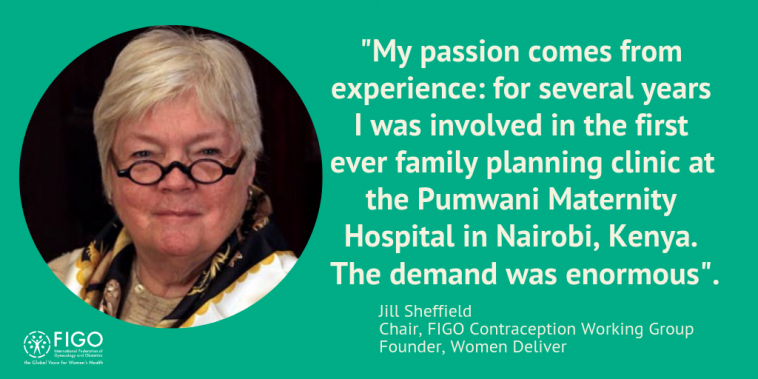Mobilising for reproductive choice

More than one billion people volunteer globally – the equivalent of over 109 million full-time workers, according to the UN Volunteers' 2018 report, State of the World’s Volunteerism.
Resilient communities are healthy communities, and FIGO members around the world make a critical contribution. On the frontline of women’s health in 132 countries, they donate their time, expertise, and platforms to improve the physical, mental, reproductive and sexual health of women throughout their lives.
We are proud to celebrate their contributions.
Jill Sheffield is a global educator and advocate for maternal, reproductive and sexual health and rights. The founder of Women Deliver, she chairs FIGO's Contraception Working Group, which provides scientific and technical advice, as well as thought leadership, clinical expertise and collaboration to support women’s health and choice.
Globally there are 214 million women with an unmet need for contraception: a major disconnect between a woman’s desire to plan her pregnancies and her ability to do so. Unmet need can lead to shorter birth-spacing, which in turn has a negative impact on both maternal and newborn health. It also puts additional economic strain on a family, perpetuating the poverty cycle.
What FIGO volunteer activities are you currently involved in?
I am involved in a number of volunteer activities, Boards and Advisory Committees, all of them, save one, focused on sexual and reproductive health and rights both globally and locally.
Why is the issue of sexual and reproductive health and rights important to you?
I feel strongly that any person, every person, needs to be able to control and plan their fertility, in order to be able to plan their future. Today there are 214 million girls and women who want to plan their next pregnancy but cannot, for a variety of reasons.
My passion comes from experience: for several years I was involved in the first ever family planning clinic at the Pumwani Maternity Hospital in Nairobi, Kenya. The demand was enormous. The services and supplies were limited, but grew rapidly in response to demand and expectation. We can change that picture and change lives.
What motivates you to volunteer?
The need for information, services and supplies related to sexual and reproductive health and rights continues to grow around the world. We can fill these gaps with just a bit of effort by many, across different professions.
For example, FIGO has National Member Societies in 132 countries which could be mobilised to help reduce the need level, and help change policies, attitudes, services. I like challenges and this field is filled with them – large-scale and small.
How has your life been shaped by other volunteers?
Actually, my whole professional life was shaped by an event that happened while I was volunteering in the family planning clinic in Kenya.
It was my 27th birthday, and we had a clinic that afternoon. I interviewed a young woman who had been waiting in the sun for several hours with two small children, a newborn and her next oldest who was not yet one.
She was 27 years old, and had already experienced 11 pregnancies. She had six living children; two of them sat on my lap while she had service. She wanted – so badly – to plan and space her pregnancies, that she had been on a bus since 4 a.m.
It was in that very real moment I realised that I was her age but had no children yet - by choice. It was then I decided I would do what I could to help girls and women plan their lives, plan their futures, plan their fertility to be safe and healthy.
The job isn’t yet done!
This interview appeared as part of a wider series celebrating FIGO volunteers. Find more stories here.